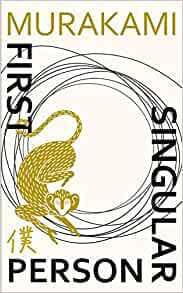

This is a clue that the author and narrator are probably one and the same. And the “LP sleeve” has “A Murakami Records Production” logo on it and a “catalogue number” – which is actually the book’s ISBN number. In another, Charlie Parker Plays Bossanova, the narrator is confirmed as being Murakami when you remove the dust jacket of the book itself, and it is revealed that the hard cover is printed to look like the vinyl record sleeve of the imaginary LP, “Charlie Parker Plays Bossanova” (as in the story’s title). For example, in The Yakult Swallows Poetry Collection, he writes about seeing his name, “Haruki Murakami”, repeated on each copy of the poetry book that he is having printed. However, there are hints throughout the book that this is the case. But this is not something you can take for granted. It is written in the first person form (that’s what the title means: “I” – the nominative form of the pronoun) and it could be that the narrator, “I”, is the author, Murakami.

To find out why, I asked, What is it about?įirst Person Singular could be about Haruki Murakami’s youth, his career as a writer, and his love life. I felt that, while it had plenty of mysteriousness and was dreamlike/nightmarish-like, it was sometimes simply incomprehensible, messy, so to speak.

My first impression was that I was bothered by First Person Singular I felt there was something strange about it but I couldn’t put my finger on what it was. Start by asking a question – What is it about? The same must be said of Murakami – I have to look at this novel within the parameters of my limited exposure to Japanese literature. But I can only ever read these works in translation and, not being Japanese, will probably never grasp the subtleties of the characterization, settings and cultural references. I have read a few Japanese authors and poets in translation, classics by Murasaki Shikibu and Matsuo Bashō, but mostly the work of post-WWII authors like Yukio Mishima and Natsuo Kirino. Killing Commendatore, by Haruki Murakami (Translated into English by Philip Gabriel and Ted Goossen)Īfter I read it, I wondered if my lingering dissatisfaction with it was due to Japanese fiction conventions, the narrative itself, or the translation.


 0 kommentar(er)
0 kommentar(er)
